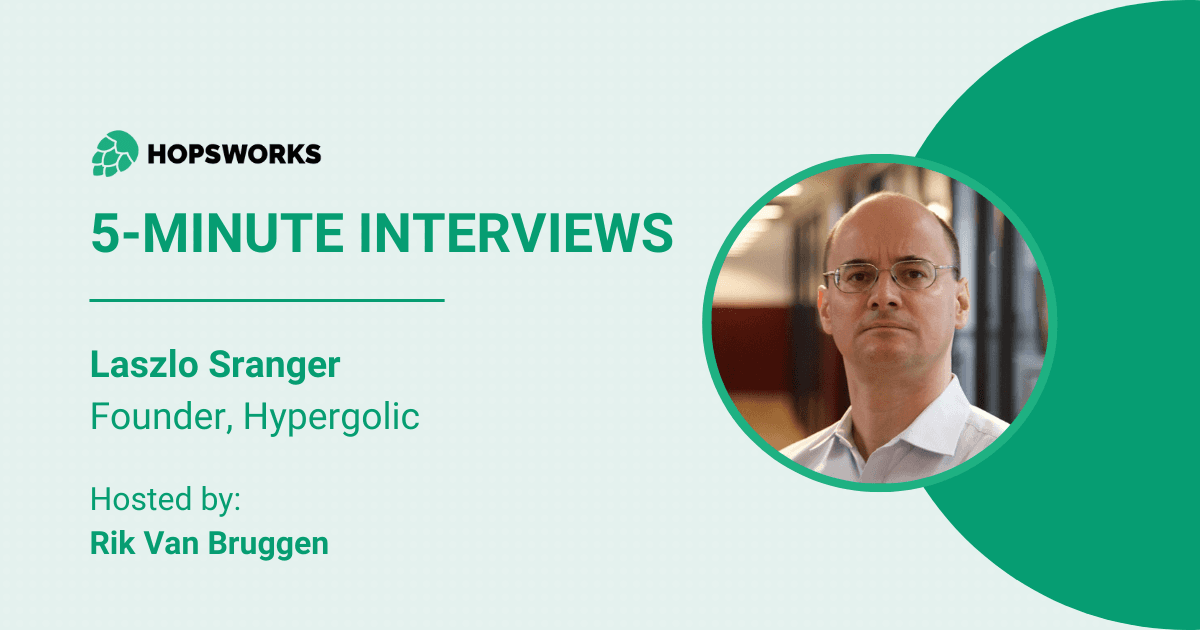5-minute interview Laszlo Sragner
We’re back with another interview, this time Rik chats with the founder of Hypergolic, Laszlo Sragner, and talks about how he helps companies with their AI strategies.

“I personally cannot imagine AI or Machine Learning without MLOps. So when we start a project from day one, if you need any kind of success you start with MLOps as well.”
We’re back with another interview, this time Rik chats with the founder of Hypergolic, Laszlo Sragner. Laszlo talks about his work at Hypergolic and how they help companies fit AI and machine learning into their business strategy.
Tell us about yourself
Laszlo: Hypergolic is a London based AI consulting company that specializes in product management. Essentially we help companies who want to get into Machine Learning and AI on how and where to start, how to fit it to their business and AI strategy and then how to implement these products. For the implementation phase, companies hire us to help them become better by making them more efficient. We provide training for Data Scientists and try to have this wide range of services for this industry and topic.
We have been doing this for about four years. Previously, I was working in a startup for Tier one investment banks, we were doing market intelligence and natural language processing. Most of our know-how that we are selling today came from there, when we had to solve problems with three, four people and then show these tier one investment banks how to do it. Before that, I worked at Candy Crush as a Data Scientist, that's where my business intelligence knowledge comes from.
The story behind the name Hypergolic is that it's a type of Rocket Fuel. It’s strange that it’s such an unknown word, I thought it was much more known and popular. I didn't know this when we named the company, but it also means extreme work in greek which is a nice coincidence.
How did you get into the field?
Laszlo: I have a degree in AI from 2002, so I’ve spent 20 years in the industry in various forms. In the last 10 years or so, the need for a more professional way of conducting AI has increased, and especially when it comes to extracting business value from it. It became clear that this requires some kind of organized engineering principle, not just research but roadmaps, technologies and know-hows and execution, and that can have a deterministic outcome once a research project succeeds. That’s what brought me to MLOps, and I personally cannot imagine AI or machine Learning without MLOps. So when we start a project from day one, if you need any kind of success you need to start with MLOps as well.
The byline of our company is “deliberate machine learning”, deliberation means that I'm doing something because I know it's going to succeed and then marching forward in a consistent phase. So taking a step back from research and R&D where you have a huge amount of failure mode. You also need to isolate the engineering part and then execute them, deterministically. One of the founding principles for our consulting company is that we recognized that a part of machine learning, the high level concept that what is being done by data scientists and machine learning Engineers, is very similar to the needs that brought agile software engineering into existence. We are dealing with problems that are very fast-moving both for external and internal reasons. It requires you to change, while at the same time the ruling principles, especially in R&D, are not very prone to adaptability. At the top you have product management, the middle is adjustable development and MLOps is at the bottom. This is how we tier these problems, and once you have these separations in your mind, then you know which task belongs to which part and what kind of principles and know-how you need to execute them.
What is it about what you do that motivates you?
Laszlo: It is because it’s a hard but solvable problem, partly because it's cross-functional. You need to be good at several disciplines at the same time and then figure out how to organize people who have completely different backgrounds. We regularly work with software Engineers and data scientists, who for example are primarily mathematicians or physicists and then Business Leaders who have no technical skills at all. How do you manage and operationalize this and how do you organize these teams? This is where we make a difference.
Do you have any interesting resources to recommend?
Laszlo: Besides my own blog, Deliberate Machine Learning, I have one resource I can recommend. One of the starting points that I usually get asked is people usually say that they know that they have technical debt and now technical debt is accepted to be a problem in machine learning, MLOps and data science. But when this is raised to managers, data scientists complain that they can't express themselves correctly on why this is important, why we should invest in this and so on. So one source where I go is Codescene by Adam Thornhill who has a lot of content in software engineering, but these concepts can be transferred into Data Science.
Listen to this and other episodes on Spotify: